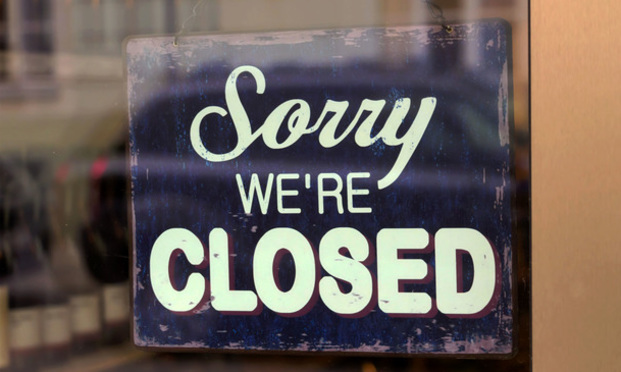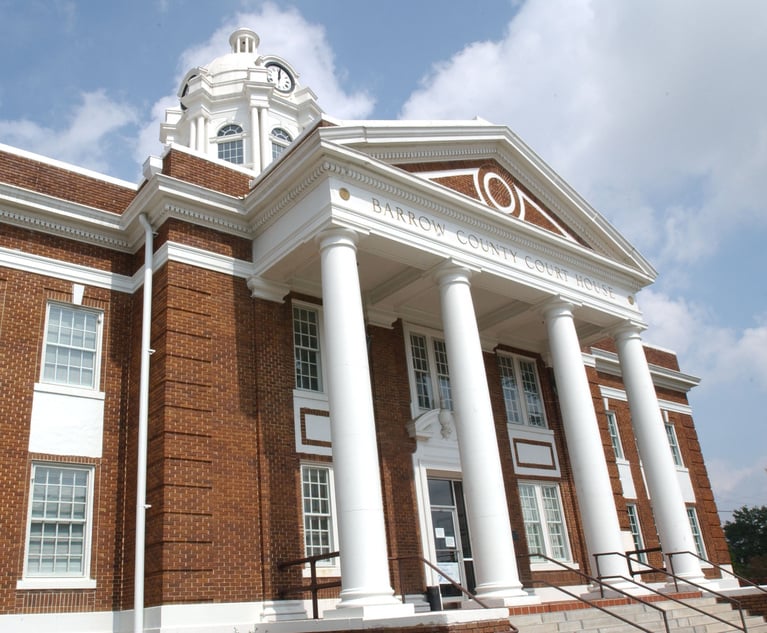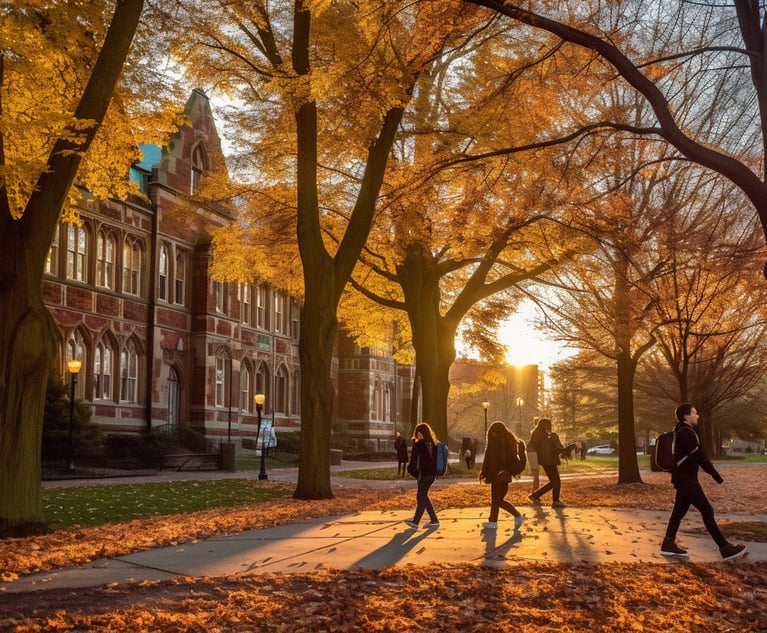Savannah Law School Is Latest to Shut Down
For the second time, Atlanta's John Marshall Law School is pulling out of Savannah, where it has operated a branch campus since 2012.
March 22, 2018 at 11:35 AM
5 minute read

Yet another law campus is closing shop.
Administrators at the short-lived Savannah Law School informed students late Wednesday that it will shutter at the end of the spring semester.
Details of the closure were scant Thursday morning, but students told the Savannah Morning News that the school's leadership said it had sold the law school's building and would not be accepting new students.
Savannah, which opened in 2012, will become the nation's fourth law school in the past year to either close or announce plans to wind down, joining Indiana Tech Law School, Whittier Law School and the Charlotte School of Law. A fifth school, Indiana's Valparaiso University School of Law, is not accepting new students as it seeks to merge with another law school or relocate. The closures come as law schools struggle to attract applicants amid a tight job market and years of declining national bar pass rates.
Dean Malcolm Morris did not respond to calls for comment Thursday. The school released a statement Thursday citing an “unforeseen national decline” in legal jobs and the law school applicant pool.
“The Board's decision was prompted by the continued small student enrollment at the branch. As such, it was the Board's responsibility to acknowledge that a viable program of legal education could not be sustained at that location,” the school's statement reads.
The law school's website states that it is not accepting applications for 2018, and instead directs people to apply to Atlanta's John Marshall Law School.
Savannah Law School is not a standalone law school. Rather, it is a branch campus of John Marshall and is accredited by the American Bar Association under the umbrella of the Atlanta school.
Students learned of the closure at a town hall meeting at 5 p.m. Wednesday. Faculty members were informed several hours earlier.
According to Katelyn Ashton, editor-in-chief of the Savannah Law Review and a part-time student due to graduate in May, students were told at the town hall that the school's enrollment was too low to be profitable. That message was delivered by Michael Markovitz, treasurer of the school's board of directors, who Ashton said is also the owner of the law school's building.
“He said the school was never able to 'attract the number of quality students needed to be sustainable,'” Ashton said in an interview Thursday. “The decision was made solely on the basis of profitability, which is unfortunate because of the great things we've done.”
Associate Professor Andrew Wright lamented the closure in a Facebook post Wednesday. “My heart aches for my colleagues and students,” he wrote. “I also feel terrible for our deposited prospective students, alumni and broader Savannah community. Our stakeholders deserve better.”
Savannah has about a dozen faculty members and roughly 200 students.
Students were told that current third-year students will be able to graduate in May, but first- and second-year students will have to complete their degrees at another location, since the campus is being sold. The ABA requires shuttering law schools to provide a “teach-out plan” to ensure current students can finish.
Ashton said the school was offering Savannah students one-time relocation scholarships of $2,000, if they transferred to the main Atlanta campus, which is 250 miles away. Current students could opt to stay in Savannah and take classes at another location, she said, or transfer to other schools altogether.
The decision caught students by surprise, Ashton said, even if earlier cutbacks hinted at financial problems. Administrators had slashed the budgets of co-curricular activities such as moot court and law review, she said, and at some point the school stopped replacing faculty members who had left. The school was also slow to fill vacant positions in the admissions department, she added.
John Marshall, in 2011 announced plans to establish a branch campus in Savannah, Georgia's second-largest city, which at the time lacked a law school. It opened the following year with 45 students, although its then-dean, Richardson Lynn, said he hoped to grow that number to 450.
While figures are not available specifically for the Savannah campus, ABA data shows that J.D. enrollment at the combined campuses fell 37 percent from 2011 to 2017.
It's the second time that Atlanta law school is pulling out of Savannah. It had a branch campus there during the 1970s and early 1980s.
Savannah operates out of a 110,000-square-foot historic former hospital on the edge of the city's famed Forsyth Park, which could offer a clue as to why the location was attractive to a buyer.
But the decision to close is a blow to current students.
“Our school has brilliant faculty,” Ashton said. “They mentored us, they guided us, they challenged us. But they were constantly let down by the administration. People are devastated here, because they didn't have any idea what was happening. We were kept in the dark intentionally.”
This content has been archived. It is available through our partners, LexisNexis® and Bloomberg Law.
To view this content, please continue to their sites.
Not a Lexis Subscriber?
Subscribe Now
Not a Bloomberg Law Subscriber?
Subscribe Now
NOT FOR REPRINT
© 2025 ALM Global, LLC, All Rights Reserved. Request academic re-use from www.copyright.com. All other uses, submit a request to [email protected]. For more information visit Asset & Logo Licensing.
You Might Like
View All
From 'Confusing Labyrinth' to Speeding 'Roller Coaster': Uncertainty Reigns in Title IX as Litigators Await Second Trump Admin
6 minute read
University of Georgia School of Law Finds Next Dean on Its Own Faculty
3 minute read
Teen Charged in Barrow School Shooting and His Father to Stay in Custody After Hearings
5 minute readTrending Stories
Who Got The Work
J. Brugh Lower of Gibbons has entered an appearance for industrial equipment supplier Devco Corporation in a pending trademark infringement lawsuit. The suit, accusing the defendant of selling knock-off Graco products, was filed Dec. 18 in New Jersey District Court by Rivkin Radler on behalf of Graco Inc. and Graco Minnesota. The case, assigned to U.S. District Judge Zahid N. Quraishi, is 3:24-cv-11294, Graco Inc. et al v. Devco Corporation.
Who Got The Work
Rebecca Maller-Stein and Kent A. Yalowitz of Arnold & Porter Kaye Scholer have entered their appearances for Hanaco Venture Capital and its executives, Lior Prosor and David Frankel, in a pending securities lawsuit. The action, filed on Dec. 24 in New York Southern District Court by Zell, Aron & Co. on behalf of Goldeneye Advisors, accuses the defendants of negligently and fraudulently managing the plaintiff's $1 million investment. The case, assigned to U.S. District Judge Vernon S. Broderick, is 1:24-cv-09918, Goldeneye Advisors, LLC v. Hanaco Venture Capital, Ltd. et al.
Who Got The Work
Attorneys from A&O Shearman has stepped in as defense counsel for Toronto-Dominion Bank and other defendants in a pending securities class action. The suit, filed Dec. 11 in New York Southern District Court by Bleichmar Fonti & Auld, accuses the defendants of concealing the bank's 'pervasive' deficiencies in regards to its compliance with the Bank Secrecy Act and the quality of its anti-money laundering controls. The case, assigned to U.S. District Judge Arun Subramanian, is 1:24-cv-09445, Gonzalez v. The Toronto-Dominion Bank et al.
Who Got The Work
Crown Castle International, a Pennsylvania company providing shared communications infrastructure, has turned to Luke D. Wolf of Gordon Rees Scully Mansukhani to fend off a pending breach-of-contract lawsuit. The court action, filed Nov. 25 in Michigan Eastern District Court by Hooper Hathaway PC on behalf of The Town Residences LLC, accuses Crown Castle of failing to transfer approximately $30,000 in utility payments from T-Mobile in breach of a roof-top lease and assignment agreement. The case, assigned to U.S. District Judge Susan K. Declercq, is 2:24-cv-13131, The Town Residences LLC v. T-Mobile US, Inc. et al.
Who Got The Work
Wilfred P. Coronato and Daniel M. Schwartz of McCarter & English have stepped in as defense counsel to Electrolux Home Products Inc. in a pending product liability lawsuit. The court action, filed Nov. 26 in New York Eastern District Court by Poulos Lopiccolo PC and Nagel Rice LLP on behalf of David Stern, alleges that the defendant's refrigerators’ drawers and shelving repeatedly break and fall apart within months after purchase. The case, assigned to U.S. District Judge Joan M. Azrack, is 2:24-cv-08204, Stern v. Electrolux Home Products, Inc.
Featured Firms
Law Offices of Gary Martin Hays & Associates, P.C.
(470) 294-1674
Law Offices of Mark E. Salomone
(857) 444-6468
Smith & Hassler
(713) 739-1250







